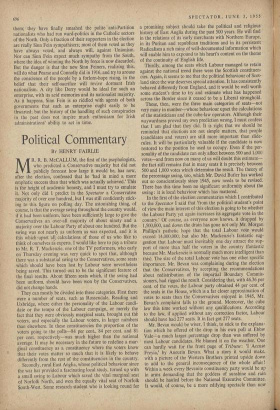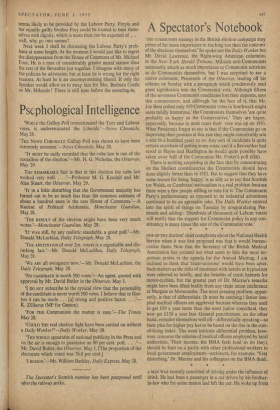Political Commentary ' BY HENRY FAIRLIE M R. R. B. McCALLUM, the
first of the psephologists, who predicted a Conservative majority but did not publicly forecast how large it would be, has now, after the election, confessed that he 'had in mind a more emphatic success than that which was actually achieved.' This is the height of academic honesty, and I must try to emulate it. Not only did I predict in the Spectator a Conservative majority of over one hundred, but I was still confidently stick- ing to this figure on polling day. The astonishing thing, of course, is that the average swing throughout the country would, if it had been uniform, have been sufficiently large to give the Conservatives an over-all majority of about ninety and a majority over the Labour Party of about one hundred. But the swing was not nearly as uniform as was expected, and it is this which • upset all calculations of those of us' who like to think of ourselves as experts. I would like here to pay a tribute to Mr. R. T. Mackenzie, one of the TV performers, who early on Thursday evening was very quick to spot that, although there was a substantial swing to the Conservatives, some seats which should have been lost by Labour were nevertheless being saved. This turned out to be the significant feature of the final results. About fifteen seats which, if the swing had been uniform, should have been won by the Conservatives, did not change hands.
They can mostly be divided into three categories. First there were a number of seats, such as Rossendale, Reading and Uxbridge, where either the personality of the Labour candi- date or the tempo of the Labour campaign, or merely the fact that they were obviously marginal seats, brought but th€ voters, and especially the Labour voters, in larger nutnbers than elsewhere. In these constituencies the proportion of the voters going to the polls-84 per cent., 84 per cent. and 81 per cent. respectively—was much higher than the national average. It may be necessary in the future to redefine a mar- ginal constituency as a constituency where the voters know that their votes matter so much that it is likely to behave differently from the rest of the constituencies in the country.
Secondly, rural East Anglia, whose political behaviour since the war has provided a fascinating local study, turned up with a small swing to Labour which saved the vital marginal seat of Norfolk North, and won the equally vital seat of Norfolk South-West. Some research student who is looking round for a promising subject should take the political and religious history of East Anglia during the past 500 years. He will find in the relations of its early merchants with Northern Europe, in its 'Puritan and republican traditions and in its persistent Radicalism a rich mine of well-documented information which will enable him to expound to his heart's content on the theme of the continuity of English life.
Thirdly, among the seats which Labour managed to retain against the national trend there were the Scottish constituen- cies. Again, it seems to me that the political behaviour of Scot- land since the war deserves special attention. It has consistently behaved differently from England, and it would be well worth some student's time to try and estimate what has happened across the Border since it ceased to be a Liberal stronghold.
These, then, were the three main categories of seats—not very many in number—whose behaviour upset the calculations of the statisticians and the cube-law operators. Although their waywardness proved my own prediction wrong, I must confess that I am glad that they did. It is right that we should be reminded that elections are not simple matters, that people (candidates and voters) are still more important than slide- rules. It will be particularly valuable if the candidate is now restored to the position he used to occupy. Even if the per- sonality of the candidate can only affect between 500 and 1,000 votes—and from now on many of us will doubt this estimate— the fact still remains that in many seats it is precisely between 500 and 1,000 votes which determine the result. The theory of the percentage swing, too, which Mr. David Butler has worked out so conscientiously since 1945, now needs to be revised. There has this time been no significant uniformity about the swing : it is local behaviour which has mattered.
In the first of the election commentaries which I contributed to the Spectator I said that 'from the political student's point of view the main interest of this election is going to be whether the Labour Party yet again increases its aggregate vote in the country.' Of course, as everyone now knows, it dropped by 1,500,000, and down the drain has gone not only Mr. Morgan Phillips's pathetic hope that the total Labour vote would exceed 14,000,000, but also Mr. Mackenzie's fantastic sug- gestion that Labour must inevitably one day attract the sup- port of more than half the voters in the country (fantastic because Mr. Mackenzie is normally much more intelligent than this). The size of the total Labour vote has one other specific importance. Mr. Bevan was complaining during the election that the Conservatives, by accepting the recommendations about redistribution of the impartial Boundary Commis- sioners, had rigged the result. Considering that, with 46.36 per cent. of the votes, the Labour party obtained 44 per cent. of the seats in the House, which is a far closer approximation of votes to seats than the Conservatives enjoyed in 1945, Mr. Bevan's complaint falls to the ground. Moreover, the cube law this time worked without any qualifications. According to the law, if applied without any correction factor, Labour should have had 277 seats. It in fact got 277 seats.
Mr. Bevan would be wiser, I think, to stick to the explana- tion which he offered of the drop in his own poll at Ebbw Vale=a much larger percentage drop than was suffered by most Labour candidates. He blamed it on the weather. One can hardly wait for the front page of Tribune: 'I Accuse Freyia,' by Aneurin Bevan. What a story it would make, with a picture of the Western Brothers printed upside down to add to the general inconsequence of the whole affair!
Within a week every Bevanite constituency party would be up in arms demanding that the goddess of sunshine and rain should be hauled before the National Executive Committee. It would, of course, be a more edifying spectacle than now seems likely to be provided by the Labour Party. Freyia and her equally guilty brother Frey could be trusted to bear them- selves with dignity, which is more than can be expected of . . . well, why go into names?
Next week I shall be discussing the Labour Party's prob- lems at some length. At the moment I would just like to regret the disappearance from the House of Commons of Mr. Michael Foot. He is a man of considerably greater moral stature than the rest of the Bevanites put together. I disagree with many of the policies he advocates, but at least he is wrong for the right reasons. At least he is an uncompromising liberal. If only the Speaker would allow us to swap him for Mrs. Barbara Castle or Mr. Mikardo ! There is still time before the swearing-in.



































 Previous page
Previous page